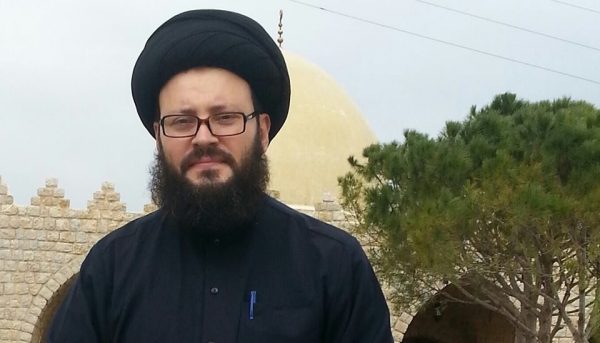
Prominent Lebanese Shiite cleric Muhammad Ali Al-Husseini urged Lebanon to strip Hezbollah leader Hassan Nasrallah of his citizenship over his “clear collaboration” and allegiance to Iran.
In an interview last week on Al-Arabiya, he called for revoking Nasrallah’s citizenship for reportedly saying Iran’s doctrine of Guardianship of the Jurist — which grants Ayatollah Ali Khamenei with supreme political power — is above Lebanon’s constitution.
“What the Iranian regime conceals with its [methods] of political dissimulation has been exposed today by Nasrallah through his slips of the tongue. These declarations have harmed the Lebanese state, constitution, and law,” said Husseini, according to the Middle East Media Research Institute which translated Nasrallah’s statements as reported by Iran’s Farda News Agency.
“This is clear collaboration of a Lebanese with a foreign country. Therefore, just like the proper action taken by Bahrain, when it revoked the citizenship of Iran’s collaborators, who were involved in tarnishing the image of Bahrain, I call upon the State of Lebanon to revoke citizenship of Hassan Nasrallah,” Husseini added.
Additionally, Husseini accused Iran of undermining Arab countries and of sowing discord in the Middle East.
“What is happening today in our nation – and I have said this in over a thousand interviews and statements – is that Persian Iran is genuinely endeavoring to shatter our Arab nation to smithereens. Iran wants to divide and infiltrate our nation. Iran is lying in wait for our nation,” he said.
“We started to have a problem in Lebanon when Iran founded Hezbollah, making it and its members guns for hire, fighting here and there in Lebanon, making threats against the UAE, Kuwait, and Yemen, and striking in Saudi Arabia,” Husseini added.
He also accused Iran and “Nasrallah’s followers” of endangering Shiite Islam, which although followed by a majority of Iranians has a significantly smaller following in the Muslim world than Sunni Islam.
Husseini is well known to be strongly against Iran’s influence in Lebanon .
Husseini is the Secretary-General of the Arab Islamic Council.
Last August he praised Iraqi Shiite cleric Muqtada al-Sadr’s visits to Saudi Arabia and the UAE stressing that the visit was aimed at improving relations between the Shiites and the Arab countries.
In an interview with Emirates News last August , Husseini predicted “the construction of a new axis between Arab Shiites and the Gulf states to break the relationship between the Arab Shiites and the regime in Iran”.
We welcome the positive steps taken by Saudi Arabia and the UAE by receiving Muqtada al-Sadr, and we consider them to be the basis for a new phase filled with hope and optimism, he said.
In response to a question on the possibility of a real change in Iranian policy, he said:
“The behavior of the Iranian regime does not change, either in the era of conservatives or reformists, because it is based on the violation of human rights and the suppression and brutal repression of dissidents, as in the Ahwaz area,” he added in a possible reference to the Ahwazi Arabs .
Ahwazi Arabs have been mistreated and persecuted in Iran, since the Iranian Revolution of 1979
Hezbollah denies
Hezbollah denied Farda News’ report quoting the party’s Secretary General Hassan Nasrallah as saying that the guardianship of the Islamic jurist (Vilayat-e Faqih) is above the Lebanese constitution and it’s mandatory to implement its orders.
Farda News Agency, which is close to the fundamentalist movement that supports Iran’s Supreme Guide Ali Khamenei, apologized for the report and blamed its correspondent for the “mistake.”
He had also acknowledged that the party’s money and weapons come from Iran.
Leave a Reply
You must be logged in to post a comment.